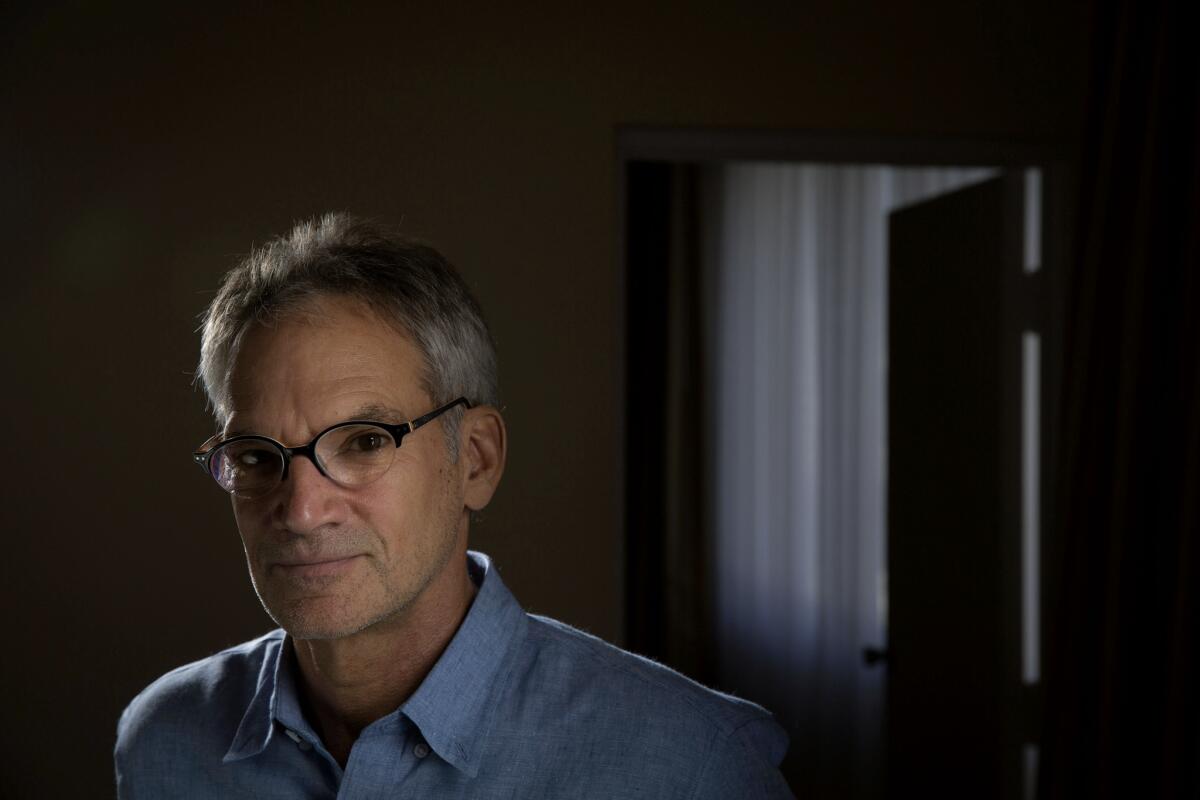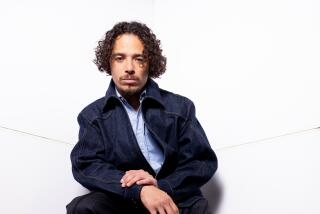‘It’s total bull’: Jon Krakauer hates ‘Everest,’ praises Sean Penn and just made a doc on polygamy

Jon Krakauer, author of 1997’s “Into Thin Air,” is upset with his portrayal in the film “Everest.”
At the movies this weekend, there will be two versions of journalist Jon Krakauer on the big screen. In “Prophet’s Prey,” a documentary about Fundamentalist Church of Jesus Christ of Latter-Day Saints, he’s seen as a hard-hitting reporter who helped put polygamist sect leader Warren Jeffs behind bars. And in “Everest,” the feature film about the infamous 1996 disaster on the world’s highest mountain, he’s the writer who stays in his tent while his climbing teammates are marooned in a blizzard.
Take a guess as to which he’d rather filmgoers see.
“It’s total bull,” Krakauer says of “Everest,” which he saw upon its debut in IMAX cinemas last weekend. “Anyone who goes to that movie and wants a fact-based account should read ‘Into Thin Air.’ ”
SIGN UP for the free Essential Arts & Culture newsletter >>
“Into Thin Air,” of course, is the 1997 bestseller Krakauer wrote about his experience on Everest, when eight climbers died after getting trapped in an unexpected storm. The new Universal Pictures film about that fateful day, directed by Baltasar Kormákur, is not based on Krakauer’s book. He sold the memoir’s rights to Sony Pictures just as the book was published, and the studio went on to make a poorly reviewed television movie about the tragedy that same year.
“People told me, ‘Movies never get made. Take the money. What do you have to lose?’” the writer, now 61, recalls. “I curse myself for selling it at all. What I learned from the TV movie was that dramatic films take dramatic license, and when you sign a document, you can do whatever you want with me. It wasn’t worth the money I got.”
Krakauer hasn’t soured on Hollywood altogether. After all, he’s in Los Angeles this week promoting “Prophet’s Prey,” which he produced and appears in as an expert because he wrote a book on the Mormon sect, 2003’s “Under the Banner of Heaven.” (A feature version of the book is currently under development with Ron Howard.) He also plays a prominent role in another documentary out this month, “Meru,” about climbers attempting to scale a 21,000-foot Himalayan mountain. And he was pleased with the way Sean Penn handled a 2007 adaptation of his “Into the Wild,” the tale of how outdoorsman Christopher McCandless ventured into Alaska and eventually starved there.
“I only went on the set on the very last day and said, ‘Sean, if you [screw] this up, I don’t want you to say I was there,’” says Krakauer, who advised Penn in an unofficial capacity because the McCandless family was in charge of the film rights. “And he didn’t [screw] it up. When he showed me the rough cut, I wanted to kiss him, I was so happy.”
But then there’s “Everest.” No one asked for Krakauer’s input on the story, and he says he was never approached by Michael Kelly, who played him in the film. In fact, he considers the film a personal affront from Kormákur himself. He’s particularly aggrieved by a scene in which his character is asked to help with the rescue by Russian guide Anatoli Boukreev but replies he cannot because he is “snow blind.”
“I never had that conversation,” Krakauer says. “Anatoli came to several tents, and not even sherpas could go out. I’m not saying I could have, or would have. What I’m saying is, no one came to my tent and asked.”
“Our intention in the tent scene that Mr. Krakauer mentions was to illustrate how helpless people were and why they might not have been able to go out and rescue people...” says Kormákur in a reply sent to The Times through his publicist. “They were not malicious. They were helpless.”
The filmmaker said he had access to a number of books written about the 1996 events on Everest, as well as “all the radio calls that went on in the Adventure Consultants camp.” (Krakauer was embedded with guide Rob Hall’s Adventure Consultants team on Everest, gathering material for an Outside Magazine article.)
Furthermore, the director says, four advisors who were “present on the mountain during that disaster and participated in the rescue” worked on the movie. “The writers and I tried to look at things from a fair point of view without choosing sides,” Kormákur says in his statement.
Still, the mention of the film causes Krakauer to bristle. And he’s not a particularly angry guy — or at least, he doesn’t seem that way when he shows up at his hotel’s restaurant and asks to search for a quieter spot because his hearing is bad. In his collared shirt, blue jeans and glasses, looking like the cool professor who conducts class on the quad when the weather’s warm, it’s hard to imagine him on Everest.
He is, by his own admission, a quiet guy. He lives in Boulder, Colo., with his wife, a botanist, in a 3,000-foot tract house.
“I’m a pretty weird person,” he says. “The last time my wife and I had someone over for dinner was maybe three years ago.”
That’s probably because he spends so much time working. He’s obsessive about research but hates writing itself. The stories he’s drawn to almost always have something to do with injustice: In recent years, he’s focused on NFL player-turned-Army soldier Pat Tillman, charity fraud allegations against “Three Cups of Tea” author Greg Mortenson and college campus rape.
NEWSLETTER: Get the day’s top headlines >>
“I’m interested in obsessive types,” he explains. “I think it’s a way of understanding myself. I’m not even religious, but I get fanaticism. I get the appeal of it. When I was 23, I climbed this mountain in Alaska called Devil’s Thumb alone. It was incredibly dangerous, and I did it because if I thought that if I did something that hard and pulled it off, my life was gonna be transformed. And of course, nothing happened. But I get the search for purpose. Happiness means nothing to me. I just want to have meaning and purpose.”
Needless to say, his work often gets under his skin and stays there for awhile. After investigating the FLDS church, he decided to foster a 18-year-old boy who had escaped the cult, paying his living expenses and community college tuition. (The young man, whom Krakauer will not name, has since graduated and is living in Denver.) He feels a “moral obligation” to help the victims — many of whom the film alleges have been sexually abused by church elders, and he often worries that the 15,000 or so remaining members of the cult might cause harm to themselves if Jeffs instructed them to do so.
“Unlike many people who see what’s going on and then turn a blind eye to it, Jon gets affected by things,” says Sam Brower, the private investigator who partners with Krakauer in “Prophet’s Prey” to look into the religion. “He’s a climber. He understands the obligation to back up who you’re with.”
Which is probably why he still feels so guilty about what happened on Everest nearly 20 years ago. In the new film, the idea is floated that Krakauer’s presence on the mountain pushed Hall to take unnecessary risks. Krakauer agrees with this: “They were taking chances trying to get clients to the summit because I was there.”
After he returned home from Nepal and the weight of what he’d seen on the mountain sunk in, Krakauer found himself in a deep depression. It wasn’t until a decade later, when he met a number of war veterans while working on his Tillman book that he realized he had post-traumatic stress disorder. He’s been going to weekly group therapy meetings for the last four years.
“I was [messed] up for years,” he says. “Depressed and I didn’t even know it.”
SIGN UP for the free Indie Focus movies newsletter >>
Still, he finds his way back to the mountains. He says he can go out his back door in Colorado and embark on world-class rock climbs — “the way people play tennis in Beverly Hills.” Jimmy Chin, who directed “Meru,” calls Krakauer a “dark horse” of the climbing world with a legacy of risky first ascents.
“We just went on a rock wall the other day in New York City, and Jon was climbing higher than me,” says Chin, who’s about two decades Krakauer’s junior. “I watched ‘Everest,’ and I can see how people might misconstrue his character. He comes on strong. And because most people don’t have the balls to have an opinion, it’s hard for some to handle those who do.”
So if people think he’s a jerk after watching “Everest,” Krakauer says, so be it. It comes with the job. He’s written about people who thought they were conveyed inappropriately, too. But he wants one thing to remain clear: Summitting the mountain isn’t a point of pride — it’s a regret.
“Everest is not real climbing. It’s rich people climbing. It’s a trophy on the wall, and they’re done,” he says. “When I say I wish I’d never gone, I really mean that.”
Follow @AmyKinLA for Hollywood news.
ALSO
India finally picks the right movie as its Oscar contender
Financial crisis drama ‘The Big Short’ to close the AFI Fest on Nov. 12
New York Film Festival could bring Oscar buzz for ‘The Walk’ and ‘Steve Jobs’
More to Read
Only good movies
Get the Indie Focus newsletter, Mark Olsen's weekly guide to the world of cinema.
You may occasionally receive promotional content from the Los Angeles Times.











